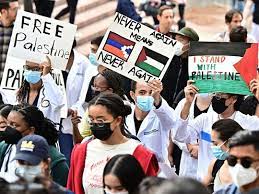Fawaz Turki
If you think the United States, a country whose national anthem proudly identifies it as “the land of the free and home of the brave” and whose citizens’ First Amendment right to free speech and assembly is considered no less than sacrosanct, is a place where people are not blacklisted — by definition having their names besmirched and their careers ruined — because the mainstream opposes their views, well, think again.
Think instead of how supporters of Israel here, a group that wields power disproportionate to their numbers, have for decades dominated the public discourse over the Palestine-Israel conflict and how now own the narrative over the Gaza war, imbuing it with a pugnacious you’re-with-us or you-go-to-hell posture aimed at not only stifling debate but shaming and even penalising those with views different from theirs.
Muzzling free speech is un-American, isn’t it? No it ain’t. Not as we speak. Not in the fog of war. The condemnation by Kathy Hochel, New York governor, of a rally in support of Palestinians in New York City’s Times Square soon after the outbreak of war as “abhorrent and morally repugnant” was just the opening salvo.
Soon after that still, when the Harvard [University] Undergraduate Palestine Solidarity Committee issued a statement, cosigned by 33 other Harvard student organisations, in which they took the Palestinian side, claiming that “the war did not occur in a vacuum” because “for the last two decades millions of Palestinians in Gaza have been forced to live in an open-air prison [while] Israel promises to ‘open the gates of hell’ … “ the group drew not only intense campus criticism but also intense national backlash — so intense that some of the co-signers found themselves under so much pressure that they retracted their endorsements. It didn’t stop there. Calls were made on the university to remove all the organisations’ school affiliations, while former University president Lawrence H. Summers called the joint statement “morally unconscionable”. Then all this was followed by several lawmakers in Congress, from both sides of the aisle, denouncing it as “anti-Semitic”, and worse.
A hefty donor to the university, William Ackman, a Harvard alumnus and hedge-fund billionaire, went further still — he demanded that the university release a list of the names of all students who were members of the cosigning groups, promising to call on Wall Street execs to refuse to hire them upon their graduation. American campuses have become redoubts of sympathy for the Palestinian cause in America — which has worried these supporters, in particular those able to wield their influence as they demand that academic institutions do something about it.
And the University of Pennsylvania is one of these institutions, which now finds itself enmeshed in what the media has called a “controversy” over a recent Palestinian festival held there, one that showcased Palestinian art and culture and drew roughly 1,500 attendees from around the world. Though the event had been held several weeks before the war, it still pushed wealthy donors to now come out of the woodwork and bring the tensions surrounding criticism of Israel on campus to a high pitch.
These folks are now up in arms, angry that the university had allowed such a conference to take place, demanding that the school’s president, Liz Magill, resign. The effort is led by one Marc Rowan, the chief executive of Apollo Global Management, who donated more $50 million to the school and recently called on other donors to call off funds. Many have joined his call. Among them was Dick Wolf, producer of the television franchise “Law and Order”, who endowed the Wolf Humanities Center and was especially miffed that — Oh, the horror, the horror! — the Palestinian festival was actually held there.
In a telephone interview with the New York Times, Mr. Rowan blurted: “President Magill’s allowing UPenn’s impramature to be associated with this conference normalised and legitimised violence that ranged from the targeting of Jewish students to horrific attacks on Israel”. It’s not altogether clear how a festival that celebrated Palestinian art and culture could be seen as a deadly threat to Jewish students and the Israeli state, but there you have it.
In the US, and to a lesser extent in Europe, the public discourse is a free-for-all — except, sadly, when it comes to Palestinians and those who support their cause. These folks simply have to be careful what they say and, yes, even what they do. Hey, we all remember the time in July, 2000, when the Freud Society of Vienna cancelled a lecture by Edward Said, the celebrated Palestinian-American academic and public intellectual, after members of the society saw a photo of him, at the Lebanese border, poised to hurl what he later called a “symbolic” stone at an Israeli guardhouse. Johan August Sculein, the society’s president, later told the New York Times in a telephone interview, “A lot of members of our society told us that they cannot accept an engaged Palestinian who also throws stones at Israeli soldiers”. Oh, yes, it’s true. The more things change … well, you know the rest of it.
Gulf News







